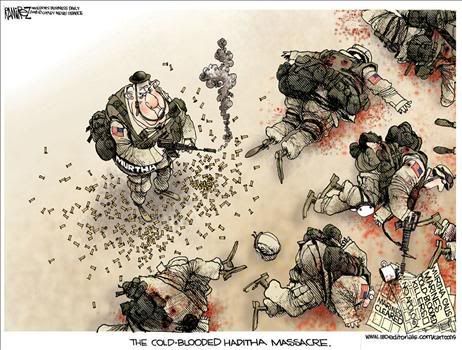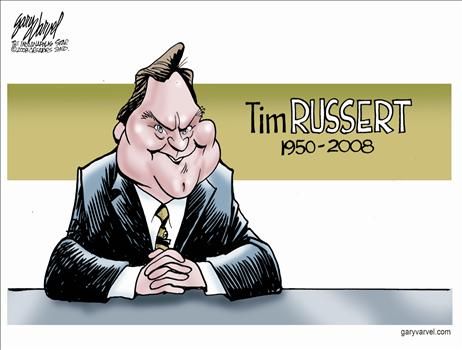Goldberg: When I say that I see a liberal bias in
the news, a lot of journalists who live in a world of politics dismiss it.
They say, "What are you talking about? We don't go easy on Democrats and
tough on Republicans." And I say there's a lot of truth to that. But
that's not my point about liberal bias. While there is no conspiracy- no conspiracy- there is like-mindedness in too many newsrooms....
Russert: There's a potential cultural
bias. And I think it's very real and very important to recognize and
to deal with. Because of background and training you come to issues with a
preconceived notion or preordained view on subjects like abortion, gun control,
campaign finance. I think many journalists growing up in the sixties and
the seventies have to be very careful about attitudes toward government,
attitudes toward the military, attitudes toward authority. It doesn't mean
there's a rightness or a wrongness. It means you have to constantly check
yourself. John Chancellor used to say, if your mother says she loves you,
check it out.
Goldberg: Why the close-mindedness when the subject
comes around to media bias? There are a whole bunch of people in the world
of journalism and the world of academia who just shut the discussion down.
They not only don't believe there's this cultural bias, they think it's not
worth talking about.
Russert: That, to me, is totally contrary to who
we're supposed to be as journalists. My view was, invite Bernard Goldberg
and Bias on my [CNBC] show. This is central to who we are.
Let's talk about it! If we miss a story, if we got our facts wrong, we
would have a post-mortem and ask ourselves, where did we go wrong? How can
we improve ourselves? So, if there's any suggestion in any way, shape, or
form that there's a liberal bias, a cultural bias, let's examine it; that's what
we do for a living.
Goldberg: When I was on your show we talked, off
the air, during a commercial, about the op-ed I wrote in the Wall Street
Journal back in 1996 about liberal bias in the news, which caused quite a
furor. You told me that you actually passed the op-ed around the newsroom
in Washington. Do you remember that?
Russert: The first person I talked to that morning
was Tom Brokaw, and I said, "Did you see the piece?" and he said, "I sure
did." I told him that I was going to give it out down here. I talked
to people about it. I said, "We have to engage on this issue. It
is imperative that we talk about this issue." If someone suggested
there was an antiblack bias, an antigay bias, an anti-American bias, we'd sit up
and say, "Let's talk about this; let's tackle it." Well, if there's a
liberal bias or a cultural bias we have to sit up and tackle it and discuss
it. We have got to be open to these things.
~~~
Russert: When I had [Democratic House Leader] Nancy
Pelosi on Meet the Press, she said that when Newt Gingrich was Speaker,
he was radical and extreme right wing and [House Majority Whip] Tom DeLay is far
right, and when I said then the dichotomy is that you would be perceived as far
left, she said, "No, no, I'm moderate, I'm centrist."
Goldberg: But you see, Tim, in my view that same
point can be made about journalists, too. When you get to the big social
issues- whether it's race or gender or feminism or gay rights- I think
journalists see conservatives correctly as conservative, but they see liberals
as middle of the road.
Russert: I think this is the most important
challenge confronting journalists: There is no preferred
position. One cannot be dismissive of one person as extreme and find
another acceptable just because of how you define liberal, conservative, or
mainstream. To a journalist covering this country there should not be a
preferred position on abortion, a preferred position on gay marriage, a
preferred position on gun control, a preferred position on campaign finance
reform. And you have to work at it and think back to where you came from
and keep applying those same standards. It really is fascinating
to me when you talk to political figures and to some journalists, they'll say
the center is here- if you are for abortion rights, for gun control,
for campaign finance reform, that's a mainstream position; and those opposed to
it are on the fringe. And that's just not the way reporters should
approach the issues.
Goldberg: But when you say it's the most important
challenge confronting journalists...
Russert: It truly is.
Goldberg: Is that because you see a problem in that
area?
Russert: Whenever we were going through the whole situation with
President Clinton on a variety of issues involving his veracity, I would say in
the newsroom: What if Richard Nixon had said this? And people would
sit up [because they hadn't though of it that way]. You have to apply a
single standard. And the single standard has to be one of objectivity and
not in any way, shape, or form demonstrating a preferred position. And if
you call Tom DeLay- and I have- the conservative Texan, then I call Ms.
Pelosi the liberal Californian.
Goldberg: Speaking of all this, you had Rush Limbaugh on
Meet the Press. How did you come to that decision?
Russert: He has the most widely listened-to radio
program in America, he has done an enormous amount to engage and encourage
political discussion around the country; he articulates a political philosophy
as well as anyone in the country. To suggest his views are anathema and
therefore should not be put on...
Goldberg: But you have heard from his critics.
Russert: Oh, sure. They want to know, "Why
would you have Rush Limbaugh on Meet the Press?" I don't sanction his political views by having him on. But to suggest
that he does not deserve the opportunity to present his views- I mean, Meet
the Press is a forum for ideas! And to have a censorship for his
ideas...[laughs]
You may disagree with him philosophically, but his demeanor, his presentation
was perfectly appropriate for Meet the Press. And to suggest
otherwise is absurd.
By the way, when I have Ralph Nader on, I say to people, "I didn't hear any
complaints there" [laughs].
Goldberg: Some conservatives complain that when the
subject gets around to taxes you tilt to the Left, that you ask too many
questions about whether we can afford tax cuts but not enough questions about
whether the government is spending too much.
Russert: I guess you can conclude that by watching
me question people, that I think deficits matter. I guess if there's a
bias, it's that yes, I do think that deficits matter. And you know where
that comes from? [laughing] It comes from Mom and Dad's kitchen
table. We never floated loans.
Goldberg: But there are two ways to balance the
budget, whether it's around the kitchen table or in Congress. One is by
raising revenue. So your father can go out and get a third
full-time job. Or you can cut out some spending.
Russert: Exactly right. I couldn't agree
more. But I question both tax cuts and spending. I was aggressive
regarding the cost of the Clinton health care plan. I was very aggressive
about hte cost of Medicare and Social Security. I constantly say to
Democrats, "Can you have it all?"
Goldberg: Let's jump to another subject. When
you interviewed Vice President Cheney on Meet the Press, you wore the
red, white, and blue ribbon on your lapel.
Russert: This was September 16, 2001, at Camp
David.
Goldberg: And you heard from critics about that,
too.
Russert: A very good friend of mine died at the
World Trade Center, and his family asked if I would, in his memory, wear this
ribbon. I never thought for a second about it.
Goldberg: And to those who say journalists
shouldn't wear red, white, and blue ribbons, that by doing that somehow you're
taking the government's side in some debate or another- which I don't frankly
see, by the way...
Russert: It is imperative that we never suggest
that there's a moral equivalency between the United States of America and the
terrorists. Period. I'll believe that until the day I die. I
have talked about being a journalist- but also being an American. And
first and foremost, you're an American. I want a debate about national
security, and who defines national security. I understand all that.
But in the end, you have to make judgments, and on that day I made a judgment
that five days after the most horrific event of my lifetime and of my
journalistic career, that for me to say to the country I too am part of this, I
too have experienced this gut-wrenching pain and agony, and I too have enormous
remorse and sympathy, with not only the people who died in the World Trade
Center, the Pentagon, and in the field in Pennsylvania, but all of us- we're in
this together; this isn't covering Democrats and Republicans or the Bills versus
the Redskins; this is us. The Taliban doesn't believe in the First
Amendment.
I'm an American and then I'm a journalist.













